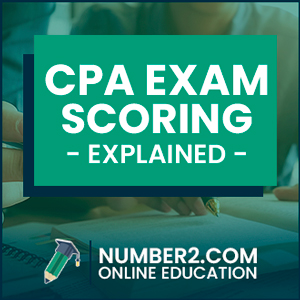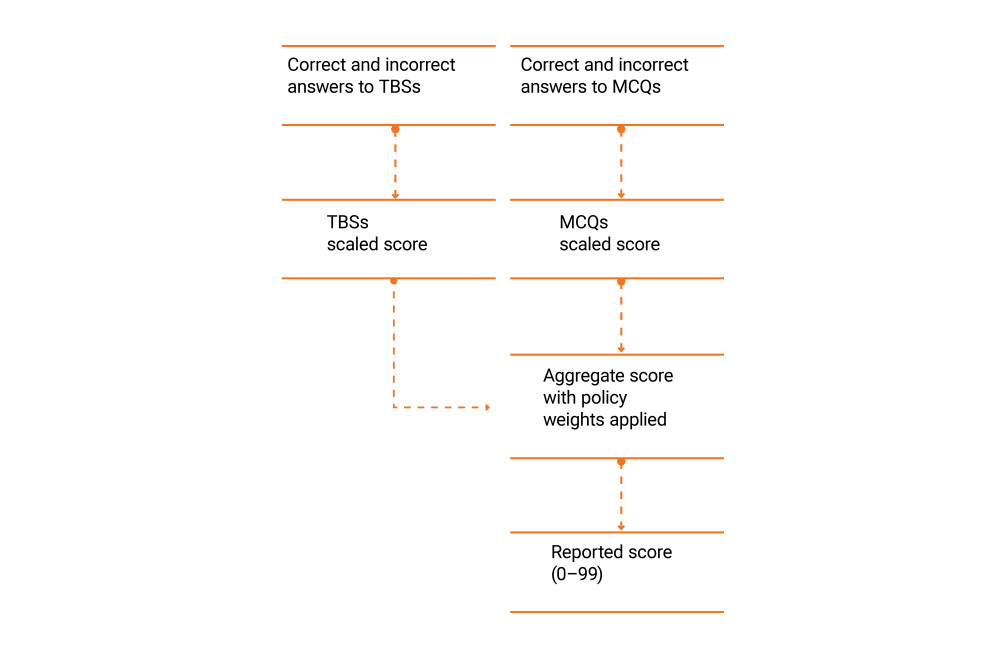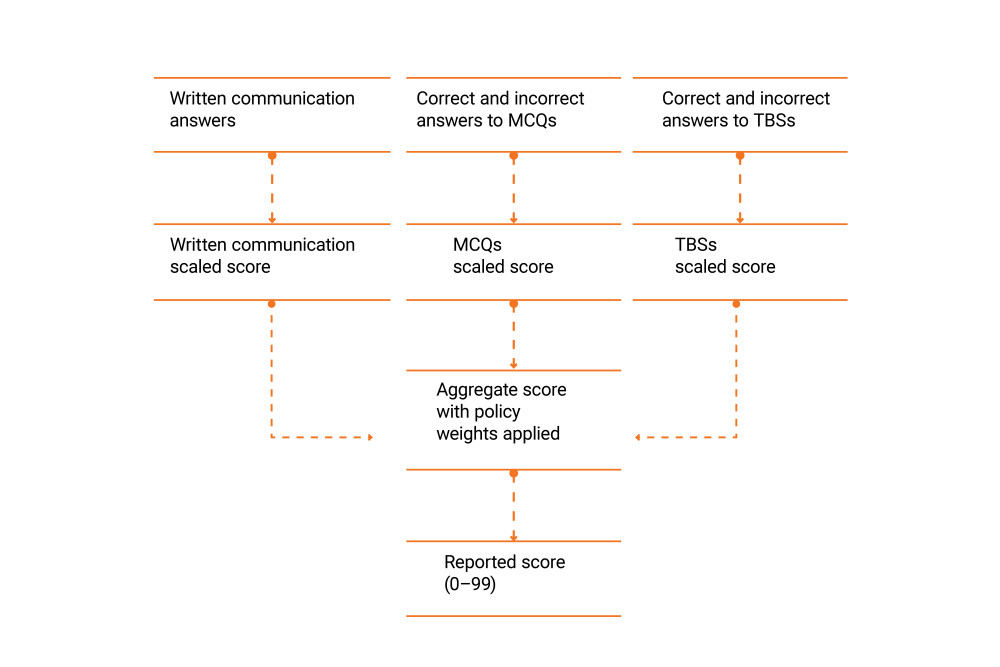 The next step after you’ve taken a section of the CPA exam is to wait for your score to be published. Understanding how the CPA exam is graded will help you interpret your final score. A passing score on the CPA exam is 75 or higher based on a grading scale of 0 to 99. This score is based on the weighted questions you answered correctly.
The next step after you’ve taken a section of the CPA exam is to wait for your score to be published. Understanding how the CPA exam is graded will help you interpret your final score. A passing score on the CPA exam is 75 or higher based on a grading scale of 0 to 99. This score is based on the weighted questions you answered correctly.
Each question carries a different weight based on its complexity and type. These questions are then used to calculate your final score and determine whether you passed or failed the exam.
Understanding the CPA exam scoring system can be a little confusing to new CPA candidates because there are a number of factors that are used to compute your overall passing score.
Let’s look at how the CPA exam is graded and how a CPA passing score is calculated, so you can understand how to pass the CPA exam on your first try.
How is the CPA Exam Graded & Scored?
The AICPA scores the CPA exam results using a weighted scale from 0-99 where each question is weighted based on its level of difficulty. Candidates must score at least 75 on each CPA exam section to pass. CPA scores only reflect correctly answered questions. Thus, candidates are not penalized for answering questions incorrectly.
It’s a common misconception, but the CPA exam score is not a raw score or a percentage. Most exams globally are scored as percentages calculated based on the number of correct answers provided compared to the overall number of questions.
For example, if you answer 75 questions out of 100 correctly, the percentage would be 75 (75/100=75%). With CPA, it is not that simple. You may provide 75 correct answers in an exam but attain a higher or lower score than that based on the weight of each question answered.
Each exam also has some pre-test questions that are not scored but are meant to prepare the candidates for the exam. Each set of questions has some weight assigned to them. The actual score will be determined by combining the weighted scores attained in each set.
CPA Exam Testlet Scoring & Exam Format
The CPA exam is made up of four individual sections: AUD, BEC, FAR, and REG. Each of these exams include question sets or testlets like multiple-choice questions (MCQs), task-based simulations (TBSs), and written communication (WC).
The testlets are scored and weighted differently from one CPA exam section to the next. Let’s look at how each are weighted.
How is the CPA Exam Score Weighted?
AUD, FAR, and REG weight multiple-choice questions and task-based simulations equally at 50% of your score. BEC includes a written communication simulation that equates to 15% of your score for that section.
BEC, on the other hand, has MCQs, TBSs, and written communication distributed at 50%, 35%, and 15%, respectively. Even though each testlet has different weights, they all help calculate your final CPA exam score.
CPA Exam Score Weights
Here is a breakdown of scoring weights for the testlets in each CPA exam section:
| CPA Exam Section | Multiple-Choice Question Scoring Weights | Task-Based Simulation Scoring Weights | Written Communication Scoring Weights |
|---|---|---|---|
| Auditing and Attestation (AUD) | 50% | 50% | N/A |
| Business Environment and Concepts (BEC) | 50% | 35% | 15% |
| Financial Accounting and Reporting (FAR) | 50% | 50% | N/A |
| Regulation (REG) | 50% | 50% | N/A |
As you can see, your CPA exam score still depends largely on being able to answer MCQs correctly, but simulations are also important. Since their are only a handful of TBS on each section, they are pretty heavily weighted.
CPA Exam MCQ Scoring
Most candidates love multiple-choice questions because it appears easier to have possible answers to choose from. The question might appear easy, but the AICPA exam writers are experts in making questions purposely confusing. They list closely related answers, so it can be tricky if you are not careful.
The MCQs for all exams come in two testlets. The number of questions in each testlet will vary by section.
- Auditing and attestation (AUD): Two testlets of 36 questions each, totaling 72 MCQs
- Regulation (REG): Two testlets of 38 questions each, totaling 76 MCQs
- Financial accounting (FAR): Two testlets of 33 questions each, totaling 66 MCQs
- Business Environment and Concepts (BEC): Two testlets of 31 questions each, totaling 62 questions
The MCQs vary in complexity for each testlet with the first one being of medium complexity. Your performance in the first testlet will determine the type of questions you get in the second testlet. If you correctly answer most of the questions in the first testlet, then the second testlet will be more difficult and vice versa.

Do not however be tempted to deliberately answer the first set of questions wrong hoping for easier ones in the second set. More tough questions are weighted higher than the simpler ones.
CPA Exam Task-Based Simulation Scoring
The task-based simulation questions are designed to test the candidate’s ability and knowledge of real-life work experiences.
They are believed to contribute to the low pass rate of CPA exams. They make up 50% of the exam in AUD, REG, and FAR while BEC contains 35% of the TBSs.
There are 8 task-based simulation questions in AUD, REG and FAR distributed in three testlets. BEC on the other hand has 4 TBSs IN two testlets of 2 questions each.
CPA Exam Written Communication Scoring
To become a successful certified public accountant, communication is key. Therefore, the BEC section has three written communication section that accounts for 15% of the total score in the exam.
Candidates get tested on their ability to write professional documents such as financial reports and memos concisely.
How are AUD, FAR, and REG Graded?
The AICPA computes your CPA exam scores for AUD, FAR, and REG using the combination of your MCQ and TBS scaled scores. They then apply policy weights to these scores to adjust them for question difficulty among other things.
Here is a breakdown of the CPA exam scoring process for AUD, FAR, and REG.

How is BEC Graded?
The AICPA calculates your CPA exam score for BEC using the same scaled score method as the other exam sections with the addition of the written communication testlet.
Here is how the AICPA scores the BEC exam section:

What is a Passing Score on the CPA Exam?
In order to pass the all four sections of CPA exam, you must score a minimum of 75 on a grading scale of 0-99. This score is not a percentage or a raw score. Instead, it is a weighted scale score based on the number of questions answered correctly and the relative difficulty of each correctly answered question.
Thus, if you scored 75 or higher, you passed the CPA exam. If you scored 74 or lower, you failed your CPA exam section.
Here is a breakdown of the passing scores for each CPA exam section.
| CPA Exam Section | Passing Score | Score Range |
|---|---|---|
| Auditing and Attestation (AUD) | 75 | 0-99 |
| Business Environment and Concepts (BEC) | 75 | 0-99 |
| Financial Accounting and Reporting (FAR) | 75 | 0-99 |
| Regulation (REG) | 75 | 0-99 |
As you can see, candidates need to get a score of at least 75 to pass each section of the CPA exam. One thing to note is that each section is scored independently. Your score on one section will not influence your score on another section.
That’s how you can pass one section and fail another multiple times.
What is the CPA Exam Score Scale?
The CPA exam is graded on a scale of 0 to 99 based on the weights of correctly answered questions. CPA candidates must achieve a minimum score of 75 in order to pass each exam section.
Is the CPA Exam Score Curved?
The CPA exam is not graded on a curve. Instead, your passing CPA score is based on a scale of 0-99 weighted on the complexity of questions.
Some exams follow a curved model where a passing score is determined by the average score attained by all the candidates who take the exam. This means that a difficult exam might have an average score of 60, making it the passing score for all candidates.
Things are entirely different with CPA. You are graded individually based on how you answer the questions without the influence of other candidates you took the exam with.
CPA Exam Pretest Questions vs Operational Questions
CPA exam pretest questions are non-graded questions on the CPA exam that do not affect your overall CPA score and are used by the AICPA to tryout questions for future CPA exams.
All the CPA exam sections have some pretest questions. They help the AICPA determine and evaluate the answers that candidates provide for future exams. There are 12 multiple-choice questions and one task-based simulation question in all the four CPA exam sections. Out of the three written communication questions in BEC, one is a pre-test question.
Operational questions are the actual questions that are scored in the CPA exam. Note that candidates are not able to tell the differences between the pre-test and operational questions. Even though you may suspect the pre-test questions based on how they are framed, appearing a bit odd from the rest, do not be a decisive judge. You are therefore encouraged to treat each question equally and answer with the seriousness they deserve.
Can I Calculate My Own CPA Exam Score?
No, you can’t calculate your own CPA exam score based on the number of questions you answered correctly because you don’t know the AICPA weighting methodology for each quetion.
The CPA exam scoring process is complicated because it’s a difficult exam. There are a lot of factors that go into your score and this makes the grading process more complex.
The CPA examination evaluation process is meticulous to ensure that every candidate gets the right score. It involves the Prometric, the AICPA, and NASBA. Save for the written communication part in BEC that is graded by humans, grades for MCQs and the TBSs are computer-generated. This ensures fairness, accuracy, and uniformity in the grades for all the candidates.
Even though you might want to understand how you performed in specific testlets or parts of the exam, or even specific exam questions, this might not be possible. You might have assumed that you answered some questions accurately and therefore confident of attaining the passing score. This is only normal. However, it is possible that the questions you were so confident about were only pre-test ones.
Can You Contest Your CPA Exam Score?
Yes, you can contest your CPA exam score and request the AICPA review your test results in hopes that there was an error. Although candidates’ scores rarely change upon review, it is possible.
Failing the CPA examination can be a painful experience. However, you should understand that almost half of all CPA candidates fail the exam. It does not mean that you are less intelligent because there are many other factors that might have contributed to that. You possibly dwelt so much on the MCQs and paid less attention to the simulation questions.
If you are confident that an error might have been made in the scoring resulting in a failing score, you have three options: review the score, appeal against the score, or retake the exam.
- Seek a score review: You can ask your state board to verify your score by ascertaining whether you indeed provided the correct answers in the exam. This is not a re-grading process.
- Appeal: Some jurisdictions allow candidates to appeal against the score attained in the CPA exam. You get a chance to see the MCQs and TBSs in which you provided an incorrect answer online. This does not apply to written communication questions.
- Retake the exam: This is the easiest option. You are free to retake the exam as many times as possible within the 18-month window.
Even though you may be allowed to review or appeal a CPA exam score, it is important to bear in mind that it is a tedious, time-consuming, and expensive process. In fact, chances of success between the two are unheard of. The best option is to simply register to retake the examination.
FAQ
Can I get my CPA exam score re-graded if I failed?
Yes, you can contest the AICPA by filing an appeal to re-grade your CPA exam if you feel there was an error in your final score. The AICPA will review your exam, re-score it, and change your score if there was an error made. More likely than not, the AICPA will not change your final score however.
How is the CPA exam actually scored?
The CPA exam is scored on a weighted scale from 0-99 based on the number of correctly answered questions. The AICPA weights each question based on it complexity and difficulty.
What is a passing score on the CPA exam?
A passing score on the CPA exam is 75 or higher. Each section is graded independently. Thus, candidates will have to pass each section with a score of 75 or higher to pass the entire CPA exam.
What is the grading scale for the CPA exam?
The AICPA grading scale for the CPA exam is 0-99 with a minimum passing score of 75. The AICPA uses this scale to calculate candidates’ scores based on the difficulty of questions ranging from average to medium, to difficult.
What does a 75 mean on CPA?
A score of 75 on the CPA is considered a passing score. Anything before a score of 75 is a failing score resulting in the candidate needing to retake the exam section.
Average attempts to pass the CPA exam
According to the AICPA, the average CPA exam candidate attempts the CPA exam at least 6 times before passing the entire exam. This means that they failed two sections before they were able to pass all four within the 18-month window.
What percent pass the CPA exam on their first try?
According to NASBA, only about 30% of CPA candidates pass the CPA exam on their first try. This low percentage illustrates the difficulty of passing all four sections of the CPA exam without failing a single section.
Which CPA exam is the hardest?
Based on the AICPA exam results, the FAR section has the lowest pass rate making it statistically the hardest CPA exam section. Although many candidates feel other sections are more difficult than FAR, the Financial Accounting and Reporting section has the highest percentage of failed attempts.

